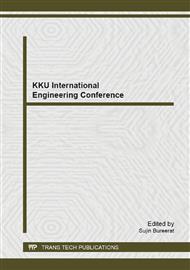[1]
J. Li,Y.D. Cao, Bayesian learning in bilateral multi-issue negotiation and its application in MAS-based electronic commerce, in: Proceedings of 2004 IEEE/WIC/ACM International Conference onIntelligent Agent Technology, 2004, p.437 – 440.
DOI: 10.1109/iat.2004.1342990
Google Scholar
[2]
S. Matwin, T. Szapiro, K. Haigh, Genetic Algorithm Approach to a Negotiation Support System, IEEE Trans. Syst., Man, Cybern., Syst. 21 (1991) 102-114.
DOI: 10.1109/21.101141
Google Scholar
[3]
R. S. Michalski, Understanding the Nature of Learning: Issues and Research Directions, in: R. S. Michalski, J. G. Carbonell, T. M. Mitchell(Eds. ), Machine Learning: An Artificial Intelligence Approach: Volume II, Kaufmann, Los Altos, CA, 1986, pp.3-25.
Google Scholar
[4]
R. Krovi A.C. Graesser W.E. Pracht, Agent Behaviors in Virtual Negotiation Environments, IEEE Trans. Syst., Man, Cybern., Syst. 29 (1999) 15-25.
DOI: 10.1109/5326.740666
Google Scholar
[5]
R.Y. Lau, M. Tang, O. Wong, S.W. Milliner, Y.P. Chen, An Evolutionary Learning Approach for Adaptive Negotiation Agents, INT J INTELL SYST, 21 (2006) 41-72.
DOI: 10.1002/int.20120
Google Scholar
[6]
L. Li,M. Yan,W. Cuimei,L. Lian, Multilateral Multi-issue Automated Negotiation Model Based on GA, in: Proceedings of2008 International Conference on Intelligent Computation Technology and Automation, Hunan, 2008, pp.85-89.
DOI: 10.1109/icicta.2008.341
Google Scholar
[7]
Y. Zhi, G. Xia, Multilateral Multi-Issue Negotiation Model of Agent Based on Hybrid Genetic Algorithm, in: Proceedings of2011 International Conference on Management and Service Science, Wuhan, 2011, pp.1-4.
DOI: 10.1109/icmss.2011.5999190
Google Scholar
[8]
K.M. Sim, Y. Guo, B. Shi, BLGAN: Bayesian Learning and Genetic Algorithm for Supporting Negotiation With Incomplete Information, IEEE Trans. Syst., Man, Cybern., Syst. 39 (2009) 198 – 211.
DOI: 10.1109/tsmcb.2008.2004501
Google Scholar
[9]
G.M. Farag S.E. AbdelRahman,R. Bahgat A.M. Moneim, Estimating negotiation agreement zone using support vector machine with genetic algorithm, in: Proceedings of2010 The 7th International Conference on Informatics and Systems, Cairo, 2010, p.1 – 8.
Google Scholar
[10]
W. Gao, An Improved Fast-convergent Genetic Algorithm, in: Proceedings of2003 IEEE International Conference on Robotics, Intelligent Systems and Signal Processing, 2003, pp.1197-1202.
DOI: 10.1109/rissp.2003.1285761
Google Scholar
[11]
R. Zheng,N. Chakraborty,T. Dai, K. Sycara, M. Lewis, Automated Bilateral Multiple-issue Negotiation with No Information About Opponent, in: Proceedings of2013 46th Hawaii International Conference onSystem Sciences , Wailea, Maui, HI, 2013, pp.520-527.
DOI: 10.1109/hicss.2013.626
Google Scholar
[12]
Information onhttp: /www. itolab. nitech. ac. jp/ANAC2011/anac-1. 5. pdf.
Google Scholar
[13]
Information onhttp: /ii. tudelft. nl/sites/default/files/aij-anac2011-pub_0. pdf.
Google Scholar


